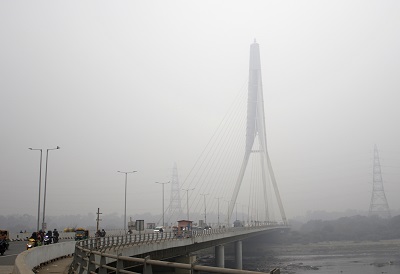
New Delhi, (Asian independent) As the clock struck midnight, ushering in the much-anticipated year 2024, residents of Delhi were greeted with a surprisingly mild start to the first day of the year. The minimum temperature in the city stood at 10.1 degrees Celsius, a departure of three notches above the seasonal average, according to India Meteorological Department (IMD).
The national capital was blanketed by shallow fog affecting visibility.
Commuters and early risers experienced varying degrees of reduced visibility, with the lowest recorded at Safdarjung at 700 metres around 7 a.m. Meanwhile, Palam reported a slightly better visibility of 1,100 metres during the same period.
According to Indian Railways, 21 trains, including Mumbai- Ferozpur, Bangalore- Nizamuddin Rajdhani, Hyderabad- New Delhi were late by hours, due to poor visibility.
However, the air quality of the national capital continued to remain in a ‘very poor’ category.
The air quality at Anand Vihar entered the ‘very poor’ category with PM 2.5 at 331 and PM 10 at 236, in the ‘poor’ category, while the NO2 reached 54 and CO was at 74 or ‘satisfactory’, as per the Central Pollution Control Board (CPCB).
The Bawana station recorded PM 2.5 at 325, in the ‘very poor’ category while the PM 10 reached 195, in the ‘moderate’ category, while the CO reached 50, or ‘good’ levels.
The AQI monitoring station at Dwarka Sector 8 recorded PM 2.5 at 373, in the ‘very poor category’ while PM 10 was at 262 or ‘poor’ while the CO was at 46, in ‘good’ levels.
The AQI at the ITO station was in the ‘very poor’ category with PM 2.5 at 316 and PM 10 at 172, in the ‘moderate’ category, while the CO was at 41, in the ‘good’ level.
The PM 2.5 at Okhla Phase-II was recorded at 332, in the ‘very poor’ category and PM 10 at 202, the ‘poor’ category.








